| Listing 1 - 10 of 18 | << page >> |
Sort by
|
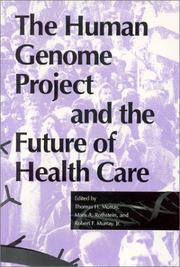
ISBN: 0253332133 Year: 1996 Publisher: Bloomington Indiana university press
Abstract | Keywords | Export | Availability | Bookmark
 Loading...
Loading...Choose an application
- Reference Manager
- EndNote
- RefWorks (Direct export to RefWorks)
This book examines how the Human Genome Project will reshape American health care. Leading scholars explore the clinical, ethical, legal, and policy implications of the Genome Project to see how it may affect the forms of health care available, who delivers it, who receives it, and who pays for it. Genetic prediction of future diseases - whether ineluctable certainties such as Huntington's, or uncertain "predispositions" for cancers, heart disease, and the like - will affect how patients and health professionals interact. It may force major reconsideration of certain institutions - such as health, life, and disability insurance - that rely on information about individuals' risks of illness and death. We may question what valid social purposes those institutions play and whether they are likely to become socially and ethically dysfunctional in light of the more extensive predictions that genetic information may make possible.
Human Genome Project --- #GBIB:CBMER --- menselijk genoom --- gezondheidszorg --- genetica (genen) --- Moral and ethical aspects. --- Social aspects. --- génome humain --- soins de santé --- génétique (gènes) --- HGP --- H.G.P.
Book
ISBN: 2130482546 9782130482543 Year: 1997 Volume: 3152. Publisher: Paris PUF
Abstract | Keywords | Export | Availability | Bookmark
 Loading...
Loading...Choose an application
- Reference Manager
- EndNote
- RefWorks (Direct export to RefWorks)
Nées dans la tourmente et le doute, les manipulations génétiques inquiètent, leur essor fantastique les a menées aux portes de l'humain. Les chercheurs et les médecins se contenteront-ils de soigner l'homme par les gènes et de soigner les gènes eux-mêmes ou bien céderont-ils à la tentation de modifier le programme humain pour créer un autre modèle ?
Molecular biology --- Genetic engineering --- Human genetics --- Génie génétique --- Génétique humaine --- Manipulations genetiques. --- menselijk genoom --- genetische engineering (manipulatie) --- génome humain --- génie génétique (ingénierie génétique) --- Genetic engineering. --- Biotechnology. --- Human genetics. --- Génie génétique --- Génétique humaine --- Methods
Book
ISBN: 9025495842 Year: 1999 Publisher: Amsterdam Contact
Abstract | Keywords | Export | Availability | Bookmark
 Loading...
Loading...Choose an application
- Reference Manager
- EndNote
- RefWorks (Direct export to RefWorks)
In het genoom, de verzamelde genetische informatie van een levend wezen, liggen de antwoorden op vragen als: wat bepaalt de groei en de ontwikkeling van een organisme? Waarom wordt het lichaam oud en sterft het? In hoeverre zijn ons gedrag en persoonlijkheid genetisch bepaald? Zit ons bewustzijn in het DNA besloten? De kennis van het genoom van de mens houdt in dat daarmee letterlijk het recept voor een mens bekend zal zijn. Dit zal het beeld van onszelf voorgoed veranderen. Matt Ridley legt in dit boek uit wat het onderzoek naar het genoom inhoudt, en ook welke gevaren er zijn. Hij geeft ook inzicht in de functie van verschillende genen en hoe ze werken.
genetica --- 631.528 --- #TELE:SISTA --- Erfelijke ziekten --- Erfelijkheid (genetica) --- 575 --- 17.023.33 --- menselijk genoom --- 61 --- Improvement by mutation (natural and induced mutation) --- génome humain --- 631.528 Improvement by mutation (natural and induced mutation) --- erfelijkheid --- Human genetics --- General ethics --- genen
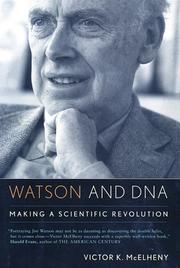
ISBN: 0738203416 Year: 2003 Publisher: Cambridge Perseus
Abstract | Keywords | Export | Availability | Bookmark
 Loading...
Loading...Choose an application
- Reference Manager
- EndNote
- RefWorks (Direct export to RefWorks)
From the discovery of the double helix to the imminent sequencing of the human genome, James Watson has been at dead center in this great biological revolution. Since the very morning after his Nobel Prize-winning discovery, he has continued to ride the scientific supernova that he and his collaborator, Francis Crick, detonated in 1953. Targeting the big questions, mobilizing the best talent, writing the textbook that defined molecular biology, energizing the "war on cancer," he has served as a prime mover of the DNA era. Now, a distinguished science reporter who has known him for decades and worked for him for four years, with unique access to the scientists who know Watson best, has written an unauthorized, non-reverential account of this extraordinary man. While Watson is probably the most influential scientist in the last half-century, he is also one of the most controversial. From the ruthless competition in the race to identify the structure of DNA, to clashes with ethicists over charged issues in genetics, to a chorus of Bronx cheers for his recent memoir, Watson has left a wake of detractors as well as fans. Until now, Watson has managed to keep control over his legend, fending off aspiring biographers with his own memoirs. Victor McElheny gets behind this invented persona, bringing us close to the relentless genius who triggered and sustained a revolution in science that affects us all. Shares the story of the Nobel Prize-winning scientist, covering his role in the race to identify the structure of DNA, his clashes with ethicists over genetics issues, and his own memoirs.
Molecular biologists --- Molecular genetics. --- DNA --- Molecular Biology --- history. --- moleculaire biologie --- menselijk genoom --- biologie moléculaire --- ADN --- génome humain --- Dna --- Molecular biology --- History. --- Molecular genetics --- Genetics --- Biologists --- Watson, James D., --- Watson, J. D.
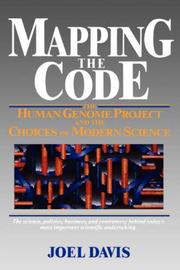
ISBN: 0471503835 9780471503835 Year: 1990 Publisher: New York Toronto Singapore Wiley
Abstract | Keywords | Export | Availability | Bookmark
 Loading...
Loading...Choose an application
- Reference Manager
- EndNote
- RefWorks (Direct export to RefWorks)
Genoom-Project [Menselijk ] --- Génome Humain [Projet de ] --- Human Genome Project --- Menselijk Genoom-Project --- Projet de Génome Humain --- Chromosome Mapping --- Ethics, Medical --- Politics --- Genome, Human --- Human gene mapping --- -Human gene mapping --- -Political aspects --- Moral and ethical aspects --- Moral and ethical aspects. --- Political aspects. --- Human genetics --- Political aspects --- Human gene mapping - Political aspects --- Human gene mapping - Moral and ethical aspects
Book
ISBN: 2130508219 9782130508212 Year: 2000 Volume: 3569 Publisher: Paris PUF
Abstract | Keywords | Export | Availability | Bookmark
 Loading...
Loading...Choose an application
- Reference Manager
- EndNote
- RefWorks (Direct export to RefWorks)
Le développement de la connaissance du génome rend de plus en plus performante l'interprétation des résultats biologiques de l'étude du polymorphisme de l'ADN, confirmant l'individualité biologique de l'être.
DNA fingerprinting --- Empreintes génétiques --- Criminologie --- Recht --- Desoxyribonucleïnezuur (DNA) --- Genetica --- menselijk genoom --- genetische vingerafdruk (DNA-identificatie) --- bio-ethiek (medische, biomedische ethiek, bio-ethische aspecten) --- Droit --- Acide désoxyribonucléique (ADN) --- Génétique --- génome humain --- empreinte génétique --- bioéthique (éthique médicale, biomédicale, aspects bioéthiques) --- Empreintes génétiques

ISBN: 0878406786 0878406778 Year: 1998 Publisher: Washington (D.C.) Georgetown university press
Abstract | Keywords | Export | Availability | Bookmark
 Loading...
Loading...Choose an application
- Reference Manager
- EndNote
- RefWorks (Direct export to RefWorks)
Completion of the Human Genome Project will make possible a staggering array of new medical technologies, including new diagnostic and screening tests for inherited disorders, gene therapies, and the ability to manipulate a person's inherited, non-disease traits. This book explores the potential harm to society if we unfairly distribute the enormous benefits of genetic technologies. The resulting division of society into genetic haves and have-nots would undermine the basic foundation of Western democratic society -- the belief in equality of opportunity. This book explains, in terms that can be understood by the general reader, how DNA works, what the Human Genome Project is, what these genetic technologies are and what they promise, and how they could disrupt our democratic society.
Human Genome Project. --- Human genome --- #SBIB:316.334.3M10 --- #SBIB:316.334.3M20 --- #SBIB:003.IO --- menselijk genoom --- genetische test --- genetische screening --- genetische verbetering (maakbare mens) --- DNA --- Genomes --- Human chromosomes --- Medische sociologie: algemeen --- Sociale epidemiologie en etiologie: sociale aspecten van ziekte en gezondheid --- génome humain --- test génétique --- dépistage génétique --- amélioration génétique --- ADN --- Human genome. --- HGP --- H.G.P.
Book
ISBN: 9461661967 9789461661968 9789462700727 9462700729 Year: 2016 Publisher: Belgium
Abstract | Keywords | Export | Availability | Bookmark
 Loading...
Loading...Choose an application
- Reference Manager
- EndNote
- RefWorks (Direct export to RefWorks)
Human genetics is not the playground of science alone. Genetics concerns all of us, for we all have DNA, genes, genomes, and chromosomes. Our genes determine partly our appearance and our behaviour, our talents and our health risks.The authors of The Human Recipe use humour to explain what we understand about human genetics. With anecdotes and topical examples, they demonstrate how genetics affects our everyday lives. What if a DNA analysis were to reveal that your biological father must be someone other than the person you’ve been calling “Dad” for years? Does genetics explain why Africans excel in athletics, Asians in gymnastics, and Europeans mainly in sports testing physical strengths? What is the difference between a genetic disease and a contagious illness?The newest developments in human genetics also raise ethical questions and issues which are currently being debated within the genetics community, and the authors do not avoid looking at these either. Should we use genetics to ensure the conception of healthy children or even “designer babies”? Should we identify genetic risks before pregnancy? Should we edit genes in embryos? Can we identify our risk for cancers and can we prevent them? What about privacy in DNA research and forensic databases? Can DNA be stolen, and if so, would this be considered a serious crime? The Human Recipe provides a clever insight into all you might want to know about human genetics in our current society.
Human genome --- Genes --- Genetics. --- Biology --- Embryology --- Mendel's law --- Adaptation (Biology) --- Breeding --- Chromosomes --- Heredity --- Mutation (Biology) --- Variation (Biology) --- Units of heredity --- Units of inheritance --- Molecular genetics --- DNA --- Genomes --- Human chromosomes --- Social aspects. --- menselijk genoom --- genetica (genen) --- genetisch onderzoek --- genetisch patent --- génome humain --- génétique (gènes) --- recherche génétique --- brevet génétique --- Genetica --- Genetisch onderzoek --- Human genetics --- Genetics
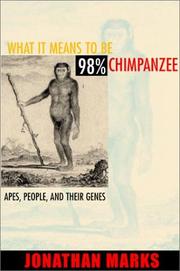
ISBN: 0520226151 Year: 2002 Publisher: Berkeley University of California press
Abstract | Keywords | Export | Availability | Bookmark
 Loading...
Loading...Choose an application
- Reference Manager
- EndNote
- RefWorks (Direct export to RefWorks)
The overwhelming similarity of human to ape genes is one of the best-known facts of modern genetic science. But what does this similarity mean? Does it, as many have suggested, have profound implications for understanding human nature? Well-known molecular anthropologist Jonathan Marks uses the human-versus-ape controversy as a jumping-off point for a radical reassessment of a range of provocative issues - from the role of science in society to racism, animal rights, and cloning. Full of interesting facts, fascinating personalities, and vivid examples that capture times, places, and controversies, this book explains and demystifies human genetic science - showing ultimately how it has always been subject to social and political influences and teaching us how to think critically about its modern findings.
Human beings --- Human evolution. --- Human genetics. --- Human molecular genetics. --- Animal nature. --- genetica (genen) --- antropologie (culturele antropologie, antropologische aspecten) --- gedrag --- moleculaire genetica --- menselijk genoom --- génétique (gènes) --- anthropologie (anthropologie culturelle, aspects anthropologiques) --- comportement --- génétique moléculaire --- génome humain --- Human evolution --- Human genetics --- Human molecular genetics --- Animal nature of human beings --- Animal nature --- Evolution (Biology) --- Physical anthropology --- Evolutionary psychology --- Philosophical anthropology --- Molecular genetics --- Genetics --- Heredity, Human --- Human biology --- Origin
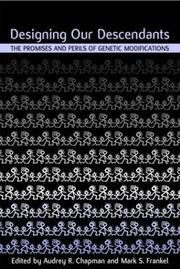
ISBN: 0801872316 Year: 2003 Publisher: Baltimore Johns Hopkins university press
Abstract | Keywords | Export | Availability | Bookmark
 Loading...
Loading...Choose an application
- Reference Manager
- EndNote
- RefWorks (Direct export to RefWorks)
The Human Genome Project, discoveries in molecular biology and new reproductive technologies have advanced our understanding of how genetic science may be used to treat persons with genetic disorders. Greater knowledge may also make possible genetic interventions to "enhance" normal human characteristics, such as height, hair or eye colour, strength, or memory, as well as the transmittal of such modifications to future generations. The prospect of inheritable genetic modifications, or IGMs, whether for therapeutic or enhancement purposes, raises complex scientific, ethical and regulatory issues. This volume presents 20 essays by physicians, scientists, philosophers, theologians, lawyers and policy analysts addressing these issues from diverse perspectives. In three sections, the authors discuss the short- and long-term scientific feasibility of IGM technology; ethical and religious issues related to safety, justice, morality, reproductive rights, and enhancement; and regulatory issues including the necessity of public input and oversight and the influence of commercialization. Their goal is to open a dialogue engaging not only scholars and scientists but also government officials and concerned citizens. The authors conclude that while IGM cannot be carried out safely and responsibly on humans utilizing current methods, it is important to begin public discussion now to determine whether, and if so how, to proceed. The prospect of inheritable genetic modifications for therapeutic or enhancement purposes raises complex scientific, ethical and regulatory issues. These 20 essays, by physicians, lawyers, theologians and others, address these issues from a variety of perspectives.
Bioethical Issues. --- Genetic Engineering. --- Genetic engineering --- Genetic engineering. --- Medical genetics. --- Public policy. --- Government policy --- Moral and ethical aspects. --- menselijk genoom --- gentherapie --- ethiek (ethische aspecten) --- godsdienst (religie, religieuze aspecten) --- génome humain --- thérapie génique --- ethique (aspects ethiques) --- religion (aspects religieux) --- Medical genetics --- Clinical genetics --- Diseases --- Heredity of disease --- Human genetics --- Medical sciences --- Pathology --- Genetic disorders --- Designed genetic change --- Engineering, Genetic --- Gene splicing --- Genetic intervention --- Genetic surgery --- Genetic recombination --- Biotechnology --- Transgenic organisms --- Moral and ethical aspects --- Genetic aspects
| Listing 1 - 10 of 18 | << page >> |
Sort by
|

 Search
Search Feedback
Feedback About UniCat
About UniCat  Help
Help News
News